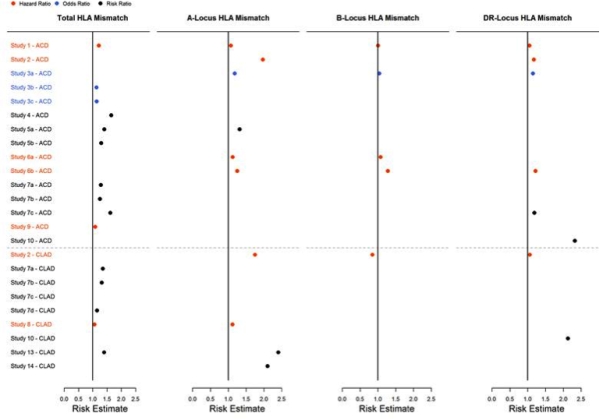Human Leukocyte Antigen (HLA) Mismatch Impact on Lung transplants outcomes.
1Medicine, Duke University School of Medicine, Durham, NC
2Biostatistics & Bioinformatics, Duke University School of Medicine, Durham, NC.
Meeting: 2016 American Transplant Congress
Abstract number: B294
Keywords: Lung transplantation
Session Information
Session Name: Poster Session B: Lung Transplantation Posters
Session Type: Poster Session
Date: Sunday, June 12, 2016
Session Time: 6:00pm-7:00pm
 Presentation Time: 6:00pm-7:00pm
Presentation Time: 6:00pm-7:00pm
Location: Halls C&D
Purpose
Reports on the impact of HLA mismatching on survival and its role in the development of bronchiolitis obliterans syndrome (BOS) or chronic allograft lung dysfunction (CLAD) after lung transplantation have been inconsistent. To better understand the heterogeneity in the study outcomes, we conducted a meta-analysis to investigate the consistency of the reported associations between HLA mismatch and both survival and CLAD development.
Methods
Using the PubMed search terms “Lung Transplant” AND “Human leukocyte antigen mismatch” we identified 48 potentially eligible studies. Of these, 17 were selected for full-text analysis, and 14 were included in the final review. We also searched the references list of all included articles to assure complete capture of all relevant publications. We examined the consistency of the reported effect estimates of the associations between numbers of HLA mismatches and (1) survival and/or (2) time to BOS/CLAD development.
Results
Overall, we observed that greater numbers of total HLA mismatches were associated with worsened survival after lung transplantation. While mismatches at the HLA-B locus were not consistently correlated with outcome, two mismatches at either the A or DR locus was consistently associated with worse survival or mortality.
Overall, total number of HLA mismatches was associated with risk of CLAD development. Consistent with this, mismatches at the HLA-A locus were associated with increased risk of CLAD development. Mismatches at the HLA-B or HLA-DR locus were not associated with risk of CLAD development. (see figure)
Conclusion
We observed consistency in the reported associations between HLA mismatch and both survival and CLAD development. Total number of HLA mismatches and individual mismatches at the A locus in particular were associated with worse survival or risk of CLAD development. Current efforts to focus on HLA differences at a molecular epitope level may improve ability to define impact of HLA histocompatibility differences on clinical outcomes after lung transplantation.

CITATION INFORMATION: Chery G, Snyder L, Durheim M, Palmer S, Neely M. Human Leukocyte Antigen (HLA) Mismatch Impact on Lung transplants outcomes. Am J Transplant. 2016;16 (suppl 3).
To cite this abstract in AMA style:
Chery G, Snyder L, Durheim M, Palmer S, Neely M. Human Leukocyte Antigen (HLA) Mismatch Impact on Lung transplants outcomes. [abstract]. Am J Transplant. 2016; 16 (suppl 3). https://atcmeetingabstracts.com/abstract/human-leukocyte-antigen-hla-mismatch-impact-on-lung-transplants-outcomes/. Accessed March 4, 2026.« Back to 2016 American Transplant Congress
